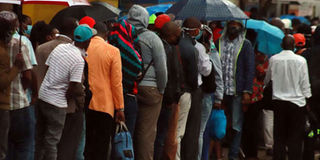Nairobians who care less about Covid-19 rules

Commuters at a bus stop in Nairobi, on April 24, 2020, disregard the social distancing rule as coronavirus cases jump to 355. PHOTO | DENNIS ONSONGO | NATION MEDIA GROUP
What you need to know:
- Apart from the constant repositioning of the masks on the face, a majority place their masks under their noses, defying the very essence of the protective gear.
- In Umoja, social distancing seems like a tough nut to crack. A spot check around the estate reveals that people still have the notion that the disease is not home yet.
Breach of guidelines aimed at flattening Kenya’s Covid-19 curve has been on the rise even as the government continues to remind the public that the power to stop the virus is in their hands. The Nation Weak Link series seeks to expose areas where behaviour change remains a stumbling block in Covid-19 war.
Nairobi County has maintained its unassailable lead with more than 200 confirmed Covid-19 cases.
With that reality, you would expect that every Nairobian is playing their part in helping the country flatten the curve.
But spot checks by the Nation in Parklands, Umoja, Embakasi, South B, the central business district, as well as Ruaka suggest otherwise.
A part from observing the containment and dusk-to-dawn curfew, some city residents seem to care less.
In Ruaka, where at least four cases of Covid-19 have been confirmed, the main market was closed recently because vendors were endangering their lives and those of their customers by crowding.
SOCIAL DISTANCING
And although businesses like supermarkets, chemists, shops, salons, boutiques and butcheries have provided hand washing facilities at their premises, many customers have not embraced the basic hygiene requirement.
“Evenings are the most difficult as people are rushing to buy food for dinner, and a number of customers are at my premises at the same time,” Mr James Karanja, a trader, told the Nation.
Spot checks at various matatu stops in the central business district (CBD) as well as in various estates across the city reveal that people are not mindful of the distance they keep from each other.
This is made worse in some bus stations, such as those at Railways and Ronald Ngala, where there is no organised queuing system.
At Fig Tree market in Parklands, social distancing becomes a challenge when it rains. “It’s been raining in the past few days so people come and seek shelter at the market, where they crowd, especially near the exit and entrance. When this happens, there is no social distancing at all,” said a trader.
And although most Nairobians wear face masks while in public, a spot check revealed that many do not wear them correctly.
Apart from the constant repositioning of the masks on the face, a majority place their masks under their noses, defying the very essence of the protective gear.
FACE MASKS
But of bigger concern is the slums. In Kibra, for instance, boda-boda and small-scale traders, especially roadside food vendors, do not wear masks.
Walking from Lindi Mosque to DC Grounds, which are about a kilometre apart, the Nation team only saw a handful of people wearing masks.
Mr Samuel Ndichu, a boda-boda rider in Kibra, said that from his meagre daily income, he would rather buy food and other basic items than a face mask, which goes for between Sh50 and Sh100.
Another concerning observation was with street children, with a majority not wearing masks. And for those who wear the masks, they are dirty.
Spot checks at different construction sites in Embakasi reveal that social distancing is still a challenge as workers report to work every day.
Mr James Odhiambo said maintaining social distance is difficult as everyone is out trying to get money to cater for their families.
“Maintaining social distancing is hard for us as we work together. We operate these machines together, carry bricks together, and at the end of the day we have something to take to our families,” he said.
At Tassia market, maintaining social distance is almost impossible. However, wearing a mask is a requirement before accessing markets.
IGNORANCE
Although traders encourage customers to wash their hands before handling fruits and vegetables in the market, most of them ignore the directive during rush hour, around 5pm and 6pm.
Most boda-boda operators in the area cluster at bus stops to wait for customers. However, they are using masks and are sceptical about sharing their helmets with their customers as they fear the spread of the virus.
In Umoja, social distancing seems like a tough nut to crack. A spot check around the estate reveals that people still have the notion that the disease is not home yet.
At social places like salons, barber shops, shops and cyber cafes, people still gather around to catch up.
Supermarkets in Embakasi have marked a one metre distance for customers to observe. They also provide water, soap and sanitisers at the entrances.
Customers without masks are not allowed into supermarkets.
By Sarah Nanjala, Hellen Shikanda, Dickens Ngicho and Claire Wasilwa




